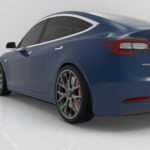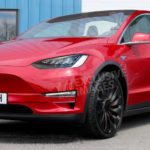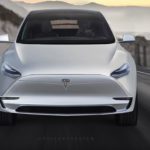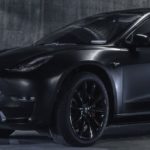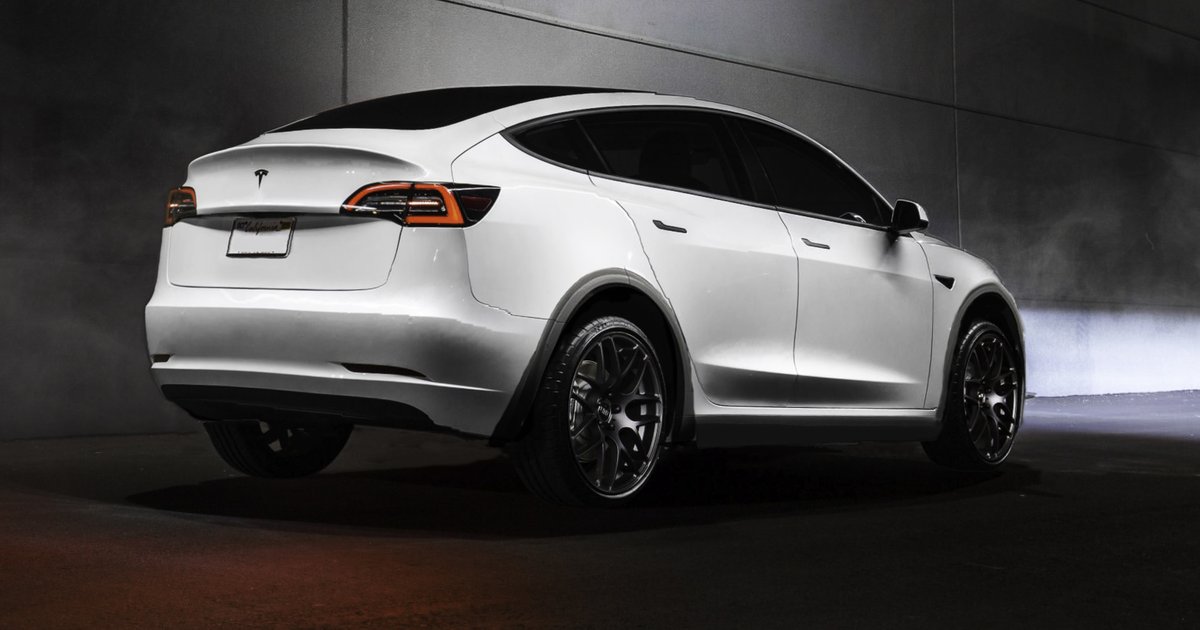

Investor's Corner
The Model Y represents a wiser Tesla and it should wake up the auto industry
It is now just a matter of time before Tesla unveils the next vehicle in its product roadmap — the Model Y. Aimed at the auto industry’s most lucrative segment today, the all-electric SUV and its potential success could definitively establish Tesla’s reputation as a successful carmaker. With this in mind, the Model Y’s 2019 release could be seen as a strategic move for Tesla, since the company is now at a point where it has matured enough to produce a vehicle of such magnitude and caliber as the all-electric SUV.
A competitive segment
The compact SUV segment in the United States is an incredibly competitive market. In 2018 alone, auto sales tracking website CarSalesBase noted that the Toyota Rav4 — the reigning king of compact SUVs — sold 427,168 units in the United States. In second place was the Nissan Rogue with 412,110 vehicles sold, and in third place was the Honda CR-V, which sold 379,013 units during 2019. Each of these vehicles sold so well, their individual sales exceeded Tesla’s record-breaking 2018 sales of 245,240 electric cars, which included 145,846 Model 3.
That said, Tesla’s 2018 sales for the Model 3 were no joke. With more than 145,000 units sold over the year, the electric sedan ended 2018 as the US’ best-selling luxury vehicle, far outselling its closest competitor — the Lexus RX, which also happens to be an SUV. It should be noted that the Model 3 accomplished this feat despite the United States generally preferring SUVs and pickup trucks over passenger cars. With the Model Y, Tesla would be removing this handicap, as the company would be competing in the SUV segment with an all-electric SUV that is bred to dominate.

From the Model 3 to the Model Y
The success of the Model 3 and the tribulations Tesla passed through during the vehicle’s ramp all contribute to help in the production of the Model Y. When Tesla started producing the Model 3, it was a carmaker whose experience was limited to the production of two relatively low-volume premium vehicles, and CEO Elon Musk was still prone to hyper-ambitious goals that border on the unrealistic. As Tesla went through the Model 3’s production challenges, and as the company hit its stride with the vehicle’s manufacturing, the electric car maker matured. This maturity became evident in Tesla’s Q2 2018 earnings call, when Elon Musk showed a notable amount of restraint and humility. Musk’s timelines since then have remained ambitious — though a lot more realistic — as shown in the company’s timetable for Gigafactory 3.
With a more mature Tesla and a more experienced Elon Musk leading the Model Y charge, the electric car maker could escape a considerable amount of the challenges it faced with the Model 3. Musk had expressed his optimism with Model Y production during the recently held fourth-quarter earnings call, when he noted that the vehicle would require much lower CAPEX than the electric sedan. Discussing the upcoming vehicle’s production further, Musk stated that the Model Y would likely see a seamless buildout, considering that it would likely be built in Gigafactory 1. This would be a notable advantage for the Model Y, considering that its battery packs would be made in the same site.
“Three-quarters of the Model Y is common with the Model 3, so it’s a much lower CAPEX per vehicle than Model 3, and the rest is also quite low. Model Y is, I think, 76% was when it got in common with the Model 3. And we’re most likely going to put Model Y production right next to — in fact, it’s part of our main Gigafactory in Nevada. So, it will just be right there. Batteries and powertrains will come out and go straight into the vehicle. So that also reduces our risk of execution and reduces the cost of having to transfer parts from California to Nevada. It’s not a for sure thing, but it’s quite likely, and it’s our default plan. I would expect Model Y will probably be — the thematic Model Y will be maybe 50% higher than Model 3, could be even double,” Musk said.
- A Tesla Model Y rendering. (Credit: Reese Wilson/Teslarati)
- Tesla Model Y rendering via AutoExpress
- Tesla Model Y rendering from Peisert Design
- An artist’s render of the Tesla Model Y. [Credit: Miguel Massé/Twitter]
The Tesla Model Y as imagined by concept artists. (Credit: Reese Wilson, AutoExpress, Peisert Design and Miguel Masse)
An impending disruption
The Model Y’s dominance will not be focused solely on the United States, either, considering that Tesla’s Gigafactory 3 in China is expected to manufacture the affordable versions of the all-electric SUV, which would be distributed to the Chinese market. Just like the United States, China is also a market that has a soft spot for SUVs. Such is the reason why the Tesla Model X — rather expensive vehicle that Musk describes as the “Fabergé egg of cars,” — is popular in China. With a lower-cost car like the Model Y in the market, Tesla’s potential in the Asian economic superpower would likely see a boost as well.
It could be said that much of Tesla’s challenges over the years were the result of its own hubris, as evidenced by the Model X’s overloaded tech and the Model 3 ramp’s over-reliance on automation. That said, there’s a good chance that Tesla would not make these same mistakes with the Model Y. With this in mind, it would be wise for veterans in the auto industry to take the upcoming vehicle seriously, and maybe come up with compelling electric cars of their own — not like seemingly converted vehicles like the Mercedes-Benz EQC either, but more like the Porsche Taycan, which was designed from the ground up as EV.
Just as the Model S and Model X caused a disruption on the higher end of the auto market, so would the Model 3 and Model Y. Provided that Tesla manages to produce both vehicles at scale, and provided that the company can release lower-cost variants that can attract a broader audience, the Model Y and its sedan sibling could ultimately become the electric cars that cement the company’s place in the hyper-competitive auto industry.
Elon Musk
Tesla analyst issues stern warning to investors: forget Trump-Musk feud

A Tesla analyst today said that investors should not lose sight of what is truly important in the grand scheme of being a shareholder, and that any near-term drama between CEO Elon Musk and U.S. President Donald Trump should not outshine the progress made by the company.
Gene Munster of Deepwater Management said that Tesla’s progress in autonomy is a much larger influence and a significantly bigger part of the company’s story than any disagreement between political policies.
Munster appeared on CNBC‘s “Closing Bell” yesterday to reiterate this point:
“One thing that is critical for Tesla investors to remember is that what’s going on with the business, with autonomy, the progress that they’re making, albeit early, is much bigger than any feud that is going to happen week-to-week between the President and Elon. So, I understand the reaction, but ultimately, I think that cooler heads will prevail. If they don’t, autonomy is still coming, one way or the other.”
BREAKING: GENE MUNSTER SAYS — $TSLA AUTONOMY IS “MUCH BIGGER” THAN ANY FEUD 👀
He says robotaxis are coming regardless ! pic.twitter.com/ytpPcwUTFy
— TheSonOfWalkley (@TheSonOfWalkley) July 2, 2025
This is a point that other analysts like Dan Ives of Wedbush and Cathie Wood of ARK Invest also made yesterday.
On two occasions over the past month, Musk and President Trump have gotten involved in a very public disagreement over the “Big Beautiful Bill,” which officially passed through the Senate yesterday and is making its way to the House of Representatives.
Musk is upset with the spending in the bill, while President Trump continues to reiterate that the Tesla CEO is only frustrated with the removal of an “EV mandate,” which does not exist federally, nor is it something Musk has expressed any frustration with.
In fact, Musk has pushed back against keeping federal subsidies for EVs, as long as gas and oil subsidies are also removed.
Nevertheless, Ives and Wood both said yesterday that they believe the political hardship between Musk and President Trump will pass because both realize the world is a better place with them on the same team.
Munster’s perspective is that, even though Musk’s feud with President Trump could apply near-term pressure to the stock, the company’s progress in autonomy is an indication that, in the long term, Tesla is set up to succeed.
Tesla launched its Robotaxi platform in Austin on June 22 and is expanding access to more members of the public. Austin residents are now reporting that they have been invited to join the program.
Elon Musk
Tesla surges following better-than-expected delivery report
Tesla saw some positive momentum during trading hours as it reported its deliveries for Q2.

Tesla (NASDAQ: TSLA) surged over four percent on Wednesday morning after the company reported better-than-expected deliveries. It was nearly right on consensus estimations, as Wall Street predicted the company would deliver 385,000 cars in Q2.
Tesla reported that it delivered 384,122 vehicles in Q2. Many, including those inside the Tesla community, were anticipating deliveries in the 340,000 to 360,000 range, while Wall Street seemed to get it just right.
Tesla delivers 384,000 vehicles in Q2 2025, deploys 9.6 GWh in energy storage
Despite Tesla meeting consensus estimations, there were real concerns about what the company would report for Q2.
There were reportedly brief pauses in production at Gigafactory Texas during the quarter and the ramp of the new Model Y configuration across the globe were expected to provide headwinds for the EV maker during the quarter.
At noon on the East Coast, Tesla shares were up about 4.5 percent.
It is expected that Tesla will likely equal the number of deliveries it completed in both of the past two years.
It has hovered at the 1.8 million mark since 2023, and it seems it is right on pace to match that once again. Early last year, Tesla said that annual growth would be “notably lower” than expected due to its development of a new vehicle platform, which will enable more affordable models to be offered to the public.
These cars are expected to be unveiled at some point this year, as Tesla said they were “on track” to be produced in the first half of the year. Tesla has yet to unveil these vehicle designs to the public.
Dan Ives of Wedbush said in a note to investors this morning that the company’s rebound in China in June reflects good things to come, especially given the Model Y and its ramp across the world.
He also said that Musk’s commitment to the company and return from politics played a major role in the company’s performance in Q2:
“If Musk continues to lead and remain in the driver’s seat, we believe Tesla is on a path to an accelerated growth path over the coming years with deliveries expected to ramp in the back-half of 2025 following the Model Y refresh cycle.”
Ives maintained his $500 price target and the ‘Outperform’ rating he held on the stock:
“Tesla’s future is in many ways the brightest it’s ever been in our view given autonomous, FSD, robotics, and many other technology innovations now on the horizon with 90% of the valuation being driven by autonomous and robotics over the coming years but Musk needs to focus on driving Tesla and not putting his political views first. We maintain our OUTPERFORM and $500 PT.”
Moving forward, investors will look to see some gradual growth over the next few quarters. At worst, Tesla should look to match 2023 and 2024 full-year delivery figures, which could be beaten if the automaker can offer those affordable models by the end of the year.
Investor's Corner
Tesla delivers 384,000 vehicles in Q2 2025, deploys 9.6 GWh in energy storage
The quarter’s 9.6 GWh energy storage deployment marks one of Tesla’s highest to date.

Tesla (NASDAQ: TSLA) has released its Q2 2025 vehicle delivery and production report. As per the report, the company delivered over 384,000 vehicles in the second quarter of 2025, while deploying 9.6 GWh in energy storage. Vehicle production also reached 410,244 units for the quarter.
Model 3/Y dominates output, ahead of earnings call
Of the 410,244 vehicles produced during the quarter, 396,835 were Model 3 and Model Y units, while 13,409 were attributed to Tesla’s other models, which includes the Cybertruck and Model S/X variants. Deliveries followed a similar pattern, with 373,728 Model 3/Ys delivered and 10,394 from other models, totaling 384,122.
The quarter’s 9.6 GWh energy storage deployment marks one of Tesla’s highest to date, signaling continued strength in the Megapack and Powerwall segments.

Year-on-year deliveries edge down, but energy shows resilience
Tesla will share its full Q2 2025 earnings results after the market closes on Wednesday, July 23, 2025, with a live earnings call scheduled for 4:30 p.m. CT / 5:30 p.m. ET. The company will publish its quarterly update at ir.tesla.com, followed by a Q&A webcast featuring company leadership. Executives such as CEO Elon Musk are expected to be in attendance.
Tesla investors are expected to inquire about several of the company’s ongoing projects in the upcoming Q2 2025 earnings call. Expected topics include the new Model Y ramp across the United States, China, and Germany, as well as the ramp of FSD in territories outside the US and China. Questions about the company’s Robotaxi business, as well as the long-referenced but yet to be announced affordable models are also expected.
-

 Elon Musk4 days ago
Elon Musk4 days agoTesla investors will be shocked by Jim Cramer’s latest assessment
-

 News1 week ago
News1 week agoTesla Robotaxi’s biggest challenge seems to be this one thing
-

 Elon Musk2 weeks ago
Elon Musk2 weeks agoFirst Look at Tesla’s Robotaxi App: features, design, and more
-

 News2 weeks ago
News2 weeks agoSpaceX and Elon Musk share insights on Starship Ship 36’s RUD
-

 News2 weeks ago
News2 weeks agoWatch Tesla’s first driverless public Robotaxi rides in Texas
-

 News1 week ago
News1 week agoWatch the first true Tesla Robotaxi intervention by safety monitor
-

 News2 weeks ago
News2 weeks agoTesla has started rolling out initial round of Robotaxi invites
-

 Elon Musk2 weeks ago
Elon Musk2 weeks agoTesla to launch in India in July with vehicles already arriving: report

